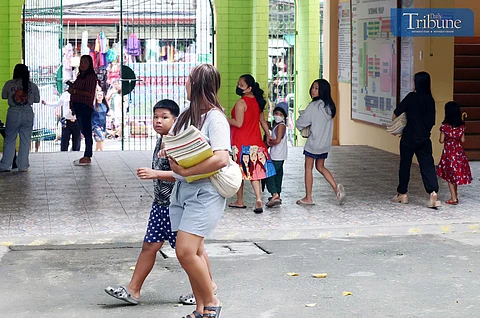
- NEWS
- the EDIT
- COMMENTARY
- BUSINESS
- LIFE
- SHOW
- ACTION
- GLOBAL GOALS
- SNAPS
- DYARYO TIRADA
- MORE

The majority of Filipinos express support for the comprehensive sexuality education (CSE) in schools, according to the Philippine Legislators’ Committee on Population and Development (PLCPD).
Citing Pulse Asia, PLCDP said 73 percent of Filipinos are in favor of teaching concepts of sexuality, sexual health, and family planning in schools in an age-appropriate and culturally sensitive manner to help students make responsible and informed choices.
“We should not underestimate the importance Filipinos place on children receiving accurate information to help protect themselves from abuse, unwanted and early pregnancies, and sexually transmitted infections such as HIV,” Au Quilala, Executive Director of PLCPD, said.
The advocacy organization, which commissioned the Pulse Asia survey in support of human development policymaking, is the convenor of the Child Rights Network, the largest advocacy alliance of organizations and government agencies pushing for child rights laws in the Philippines.
“What is even more encouraging is the positive outlook majority of Filipinos have in entrusting schools as spaces where children can have responsible discussions about their bodies and relationships,” Quilala added.
Quilala pointed out that the survey comes "at a critical time, as teen pregnancy prevention legislation is being derailed and reproductive health rights are under attack from disinformation campaigns."
She also lamented efforts spreading rumors and clickbait claims – such as falsely and maliciously alleging that CSE is about teaching childhood masturbation – to undermine long-studied proposals with strong backing from civil society and the government, including parents and faith-based organizations.
This is also against the background of the rising cases of adolescent pregnancy, particularly among girls aged 10 to 14 and even younger, which have been increasing in recent years, according to the Philippine Statistics Authority.
More alarmingly, government data shows that most girls, especially in the 10 to 14 age bracket, were sired by men much older than them, revealing a sexual abuse or statutory rape dimension.
While CSE is not the only solution to preventing abuse, Quilala stressed that it is part of the solution.
"We cannot turn a blind eye on children being sexually abused or becoming victims of statutory rape because we failed to give them the proper information they need in order to protect themselves,” she added.
Parents need support
Quilala likewise stressed that sexuality education is best taught at home, with parents taking responsibility for it, however, many Filipino parents also need support on how to openly and properly talk to their children about sex.
"These conversations are often avoided, or the information shared is incomplete, which prevents children from getting the real help they need. This is why we see cases of teen pregnancy, HIV, and sexual abuse or statutory rape,” she continued.
According to a study by the University of the Philippines Population Institute (UPPI), 44 percent of young Filipino females and 39 percent of young Filipino males lack material resources about sex, often relying on social media.
Youth awareness of human immunodeficiency virus (HIV) and acquired immunodeficiency syndrome (AIDS) also dropped to its lowest level since 1994, according to another UPPI study.
“It is much better that children learn about topics such as sexuality and reproductive health in an age‑appropriate and culturally sensitive manner in settings such as schools, rather than picking them up from random sources without any proper guidance from an adult,” Quilala said.
The Teen Pregnancy Prevention Bill, if passed into law, will complement our existing laws on statutory rape, anti-online sexual abuse and exploitation of children, the prohibition of child marriage, and the Reproductive Health Law — measures that the PLCPD and the Child Rights Network have advocated for, according to Quilala.
Call to lawmakers to pass Teen Pregnancy Prevention Law now
With that, Quilala urged policymakers and lawmakers "to listen to the insight" of the Filipinos "and fully implement comprehensive sexuality education in schools."
"Pass important legislative measures such as the Teen Pregnancy Prevention Bill, and move discussions away from those that distract and stigmatize the indispensable role of sexuality education toward a healthier and more empowered community,” she added.
She likewise pointed out that the Teen Pregnancy Prevention Bill, for instance, will not only strengthen CSE but also support teen parents to continue their education and receive health services, increase teen access to reproductive health services, and support teen male involvement in preventing adolescent pregnancies.
